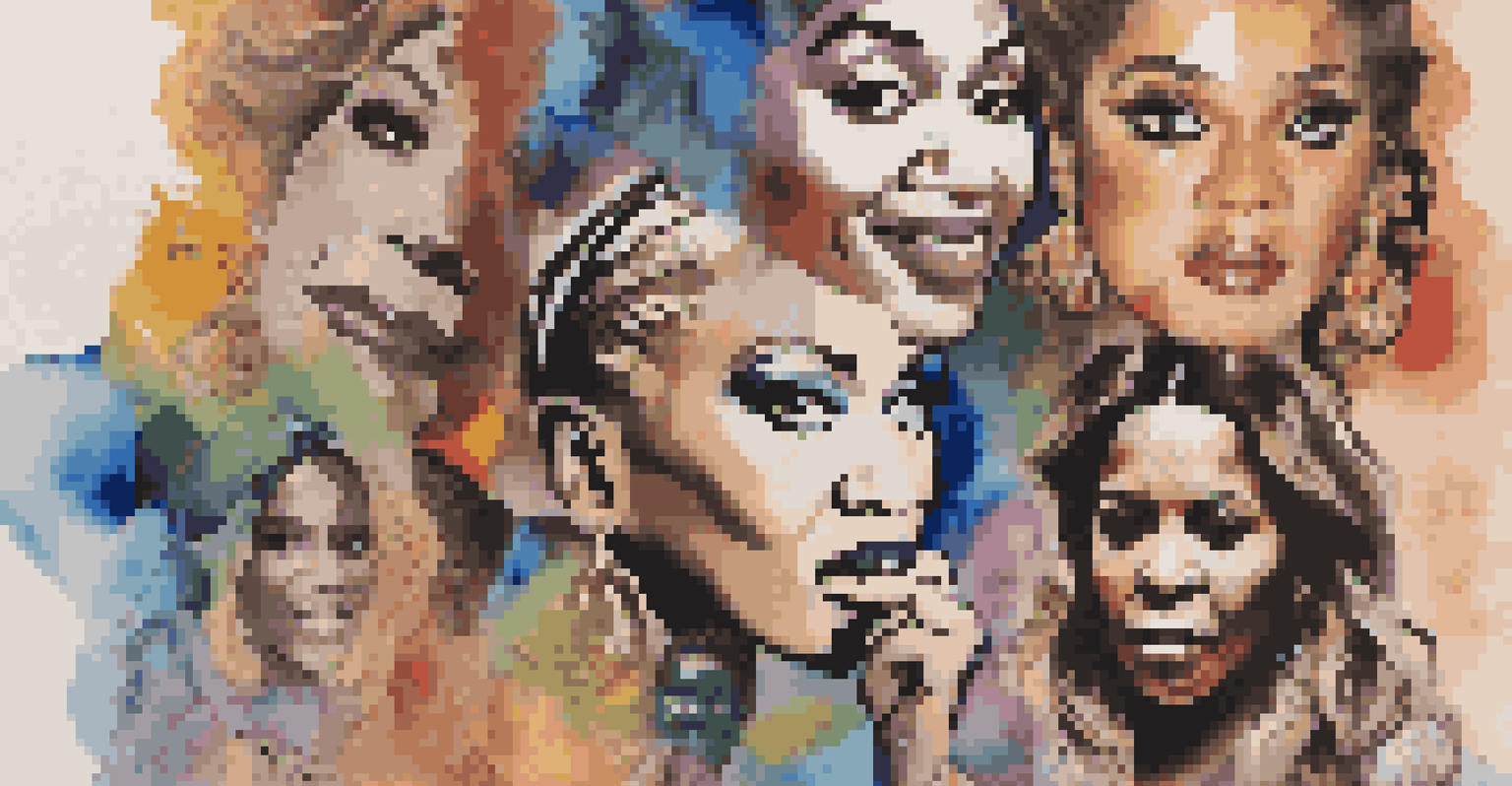Women in Music Activism: Changing the Industry Landscape

The Rise of Women in Music Activism
In recent years, women in the music industry have increasingly taken on activist roles, advocating for gender equality and representation. This shift is not just a trend; it's a powerful movement reshaping the landscape of music. Artists like Billie Eilish and Lizzo have used their platforms to speak out on issues ranging from body positivity to mental health, inspiring a generation of fans and musicians alike.
Music is a powerful force for change, and when women are empowered to use their voices, they can reshape the world.
Women are no longer just passive participants in the music scene; they are leading the charge for change. Organizations such as Women in Music and She Is the Music are providing essential support and resources to female artists. By creating networks that promote collaboration and mentorship, these initiatives are fostering an environment where women's voices can be heard and celebrated.
This activism highlights the necessity of addressing longstanding issues like pay disparity and sexual harassment in the industry. As more women step forward to share their stories, the music world is being forced to confront its past and evolve. This cultural shift is not only empowering women but is also enriching the music industry as a whole.
Iconic Women Leading the Charge
Throughout history, women have been at the forefront of musical innovation, and today’s activists are no exception. Icons like Madonna and Aretha Franklin paved the way for future generations, but the current wave of artists is redefining what it means to be a female musician. These women are not only talented performers but also advocates for social justice and equality.

Contemporary musicians such as Taylor Swift and Beyoncé have used their influence to address critical social issues, from racial injustice to LGBTQ+ rights. Their ability to blend activism with artistry has created a blueprint for how musicians can engage with their audiences on deeper levels. By leveraging their fame, they are not only raising awareness but also inspiring action.
Women Lead Music Activism
Female artists are increasingly using their platforms to advocate for gender equality and representation in the music industry.
Moreover, the rise of social media has amplified these voices, allowing artists to connect directly with fans and fellow activists. Platforms like Instagram and Twitter provide a space for discussion and mobilization, transforming the music industry into a hub of activism. This dynamic engagement is crucial for fostering change and promoting solidarity among women in music.
Challenges Faced by Women in Music
Despite the progress, women in the music industry continue to face significant challenges. Gender bias, unequal pay, and lack of opportunities are persistent issues that hinder female artists. The industry is still predominantly male-dominated, which can create barriers for women trying to break through.
The future is female. We need to lift each other up and create spaces for women to thrive in music and beyond.
For many female musicians, the pressure to conform to traditional gender roles can be overwhelming. They often feel compelled to navigate a landscape that expects them to be both talented performers and relatable figures. This duality can lead to burnout and mental health issues, which are often overlooked in discussions about women's empowerment in music.
Additionally, the lack of representation in leadership roles further complicates the situation. With fewer women in executive positions, decision-making processes may not prioritize the needs and concerns of female artists. Addressing these challenges requires a collective effort from the industry, fans, and advocates to create a more equitable environment.
The Role of Music Festivals in Amplifying Voices
Music festivals have become a vital platform for women in music activism to showcase their talents and messages. Events like Coachella and Glastonbury are increasingly prioritizing female performers, creating opportunities for women to shine. This visibility not only empowers artists but also encourages festival attendees to engage with the themes of activism presented on stage.
Moreover, festivals often host panels and workshops that focus on issues relevant to women in the industry. These discussions provide a space for sharing experiences and strategies for overcoming challenges. By fostering a sense of community, festivals play a crucial role in supporting female artists and activists alike.
Challenges Persist for Female Artists
Despite progress, women in music still face significant barriers such as gender bias, unequal pay, and limited opportunities.
The energy of live music, combined with powerful messaging, creates an unforgettable experience for audiences. When women take the stage and speak out, they inspire others to join the fight for equality. Music festivals thus serve as a catalyst for change, blending entertainment with activism in a way that resonates deeply with fans.
Grassroots Movements and Their Impact
Grassroots movements have been instrumental in driving change within the music industry. Initiatives like #MeToo and Time’s Up have sparked conversations about harassment and abuse, pushing for accountability and reforms. These movements empower individuals to share their stories, creating a collective force for change that resonates across genres and platforms.
Women-led organizations are also making strides by offering resources and support to emerging artists. Programs that focus on mentorship and skill-building are essential for helping women navigate the complexities of the music business. By equipping female musicians with the tools they need, these movements are fostering a new generation of empowered artists.
The impact of grassroots activism is not limited to the music industry; it influences broader societal change. As women in music continue to advocate for their rights, they inspire others in different fields to stand up and demand equality. This interconnectedness highlights the power of music as a vehicle for social change.
The Importance of Representation
Representation matters in the music industry, as it shapes the narratives and experiences seen by audiences. When women of diverse backgrounds are showcased, it enriches the musical landscape and broadens listeners' perspectives. This visibility not only empowers artists but also resonates with fans who see themselves reflected in their stories.
By promoting diverse voices, the industry can break down stereotypes and challenge the status quo. Female artists from different cultures and backgrounds bring unique perspectives that contribute to a more inclusive music scene. This diversity fosters creativity and innovation, resulting in a richer tapestry of musical expression.
Grassroots Movements Drive Change
Initiatives like #MeToo and Time’s Up empower women in music to share their stories and demand accountability within the industry.
Moreover, representation can inspire young girls to pursue their dreams in music. When they see successful women who look like them, it encourages them to believe in their potential. As more women rise to prominence in various genres, they pave the way for future generations, fostering a culture of empowerment and ambition.
Looking Ahead: A Future of Equality
As the music industry continues to evolve, the future looks promising for women in music activism. With increased awareness and support, the momentum for change is undeniable. The collective efforts of artists, organizations, and fans are creating a ripple effect that is transforming the landscape.
However, there is still much work to be done. It is essential to maintain the pressure on industry leaders to prioritize diversity and inclusion in all aspects of their operations. By holding them accountable, we can ensure that progress is not just a temporary trend but a lasting commitment to equality.

Ultimately, the fight for women's rights in music is part of a larger social movement. As women continue to raise their voices and demand change, they inspire others to join the cause. Together, they can create a music industry that is not only equitable but also reflective of the diverse society we live in.